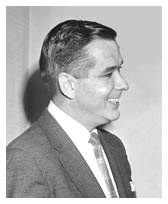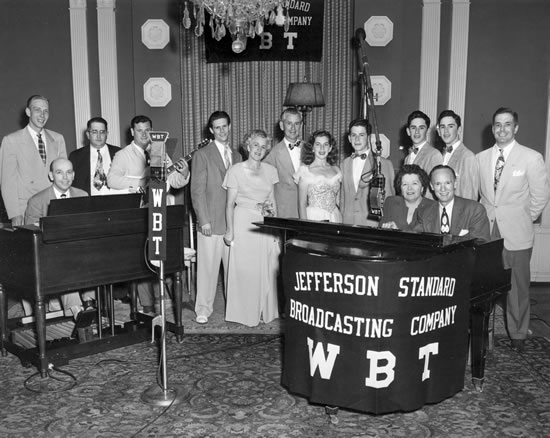His full name was Kenneth I. Tredwell, Jr. He was born on October 1, 1919 in Whitneyville, Conn., and died on May 28, 1983 in San Francisco, Calif.
Ken grew up in New Rochelle, NY, where, in 1935, he was selected by the Standard-Star as sales-demonstration champion. That year, he "captured international high honors as sales-demonstration champion in Cincinnati, OH." Among other accomplishments, he was an Eagle Scout and was Lou Gehrig's paperboy.
Ken graduated from University of Pennsylvania, Wharton School of Finance, in 1941. Having been in the ROTC, he entered the service (8th Army Air Force) as an officer. He served in Special Services from 1941 to 1945, exiting as a Major, with a Bronze Star for meritorious service. He wrote speeches for, among others, Lt. General J. H. Doolittle, was published in the Stars and Stripes (the Army newspaper), coordinated a Victory Bond Drive, worked with Cecil Madden (BBC Executive Producer) for two years on the American Eagle program in Britain, doing "roving microphone" segments each Saturday. The Eagle was broadcast to the U.S. via the Mutual Broadcasting System.
In England, Ken met a California girl, Juanita (Nita) Bruton, who was an ambulance driver and War Orphans supervisor for the American Red Cross. Nita's flat was bombed out twice "over there."
Ken and Nita returned to the U.S. and were married on August 19, 1945, in Wareham, Mass. Her son, Scott, says, "Mom used to enjoy recollecting that the Brits would complain that Yanks were overpaid, oversexed and over there; the response was that the Brits were underpaid, undersexed and under Ike. They had dinner with Glenn Miller the night before his tragic flight."
After the war, Ken briefly worked as an announcer at WGTC radio in Greenville, NC, then was programming director at WTIK in Durham before joining WBT in 1946. In Charlotte, Ken and Nita began raising a family of two sons, Scott, born in 1946, and Steve in 1949.
He likely entered the company as WBT's program director. If not, he quickly ascended to that position, where he was very much a hands-on manager, creating and producing programs, even writing scripts.
Kenneth Johnson, the oldest "child" in the Johnson Family Singers, remembers:
[When he] came to WBT around 1946, I believe he was Program Director. What I remember most vividly was his writing the scripts for our Quaker Oats programs, broadcast on a regional network of CBS. He also was the writer-producer of the weekly program, "Fun By the Fireside."
When television came to Jefferson Standard Broadcasting, Ken moved to WBTV as its program manager. Bailey Hobgood, who was in a succession of WBT program directors after Ken left radio, recalls:
During my time as program director for radio, 1954-59, Bob Covington was executive officer for WBT and Ken Tredwell the same for WBTV (not sure about proper titles). This separation helped WBT at a time when radio was beginning to lose audience and money, and WBTV needed some steering as TV took off. Since I was with radio I did not have a great deal of contact with Ken but many of his ideas for TV were designed to share with radio. He was instrumental in bringing in The Harvesters gospel quartet, who became popular with shows on both radio and TV. He also had the idea for "People's Playhouse," a series for radio only, which was written and directed by Bob White, hired to do the show on a free lance basis. I don't recall much success with the Playhouse but at least it was different from other radio in Charlotte at the time.
I recall that Ken, Bob Rierson (WBTV production manager) and I were mainly responsible for bringing Loonis McGlohon on staff as music librarian and talent on both stations. Ken was always upbeat, passionate and enthusiastic about his work. He was an idea man and was never afraid to try something new. I remember Ken caring about radio and doing what he could to help us. I had a lot of respect for Ken and enjoyed my relationship with him.
In 1953 Ken was made a vice-president at Jefferson Standard Broadcasting. During his tenure he was active in Charlotte's Executive Club, Chamber of Commerce, United Community Services, Travelers Aid Society, Rotary Club, Red Cross and Charlotte Symphony. He was the emcee for the 1955 dedication of Ovens Auditorium. He served for a time as director of Television Stations, Inc., a regional association of broadcasters.
After 15 years, in 1961, Ken left Jefferson and went to Wachovia Bank, Winston-Salem, as V/P-Advertising, where he stayed until 1971. From Kenneth Johnson:
The last time I saw Ken was in the Reynolds Building, Winston-Salem, where he was then employed. A genial, happy fellow, he would usually greet me by singing the theme song for our [Johnson Family] program, "When the family gets together 'round the old piano, the sound of voices singing fills the air ...."
The couple left North Carolina and lived in Phoenix, Arizona, where Ken worked for an automotive fuel additive company. Then they moved to the San Francisco area, where he worked for several years at an executive placement agency. In 1983 Ken died of colon cancer at 63, the same age as his father at his death. Nita lived to age 95, and passed in 2007. They left behind two sons, three grandchildren, and five great-grandchildren.























 Ralph Smith lived in our neighborhood (Burtonwood - past East Mecklenburg HS on Old Monroe Road); many WBTV staff attended pool parties at our home; Clyde McLean, his wife + his great Danes, would visit us each Christmas Eve to assemble our train tracks around the tree (none of our Tredwell branch had a smidgen of mechanical aptitude); and I generally "sold" more raffle tickets during my early school years as my dad must have sold them to everyone at the station.
Ralph Smith lived in our neighborhood (Burtonwood - past East Mecklenburg HS on Old Monroe Road); many WBTV staff attended pool parties at our home; Clyde McLean, his wife + his great Danes, would visit us each Christmas Eve to assemble our train tracks around the tree (none of our Tredwell branch had a smidgen of mechanical aptitude); and I generally "sold" more raffle tickets during my early school years as my dad must have sold them to everyone at the station.  In his early twenties, after graduating from a prestigious university, Ken enlisted in the Army Air Force and soon won a coveted assignment working with the BBC in London, and with many famous entertainers and American generals . You'll see a photo of him interviewing troops; letters from Cecil Madden, his producer of the American Eagle radio show, on which Ken conducted interviews; and, issued at the end of the war in Europe, a souvenir roster and photo of all those who worked or appeared on the show.
In his early twenties, after graduating from a prestigious university, Ken enlisted in the Army Air Force and soon won a coveted assignment working with the BBC in London, and with many famous entertainers and American generals . You'll see a photo of him interviewing troops; letters from Cecil Madden, his producer of the American Eagle radio show, on which Ken conducted interviews; and, issued at the end of the war in Europe, a souvenir roster and photo of all those who worked or appeared on the show.